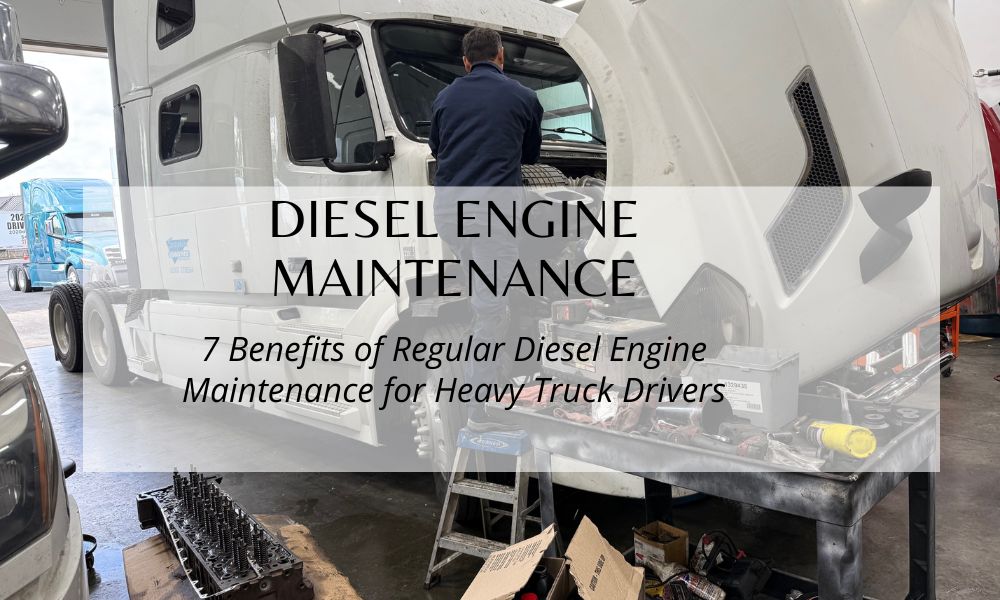
The old-timers will tell you diesels used to run forever on nothing but oil changes. Maybe that was true for the mechanical engines of the 70s and 80s. Today’s diesels? They’re computers with pistons, running tighter tolerances and higher pressures than ever before.
At 2020 Truck and Trailer Repair, we work on these modern powerplants daily. The technology has changed, and so have the benefits of staying on top of diesel engine maintenance. Here’s what actually happens when you maintain these complex machines properly.
1. Your Turbo Stays in Its Sweet Spot Longer
Modern variable geometry turbos are incredible when they work right. They’re expensive nightmares when they fail. The difference often comes down to 30-second cool-down periods and clean oil.
A VGT turbo spins up to 200,000 RPM. At shutdown, that spinning assembly relies on oil for cooling. Dirty oil cokes on the hot shaft, creating buildup that eventually seizes the variable vanes. Once those vanes stick, you’re looking at $2,500+ in diesel engine repair costs.
Regular oil changes using quality CJ-4 or CK-4 rated oils prevent coking. Simple diesel engine maintenance like this extends turbo life from 250,000 miles to 500,000 or more. We’ve seen properly maintained turbos outlast engines.
Quick turbo facts:
- Exhaust temperatures can exceed 1,200°F
- Shaft speeds rival jet engines
- Oil film thickness measured in microns
- 30-second idle cooldown prevents most failures
2. Emission Systems Work Instead of Working Against You
Nobody loves emission systems, but they’re reality. The secret most drivers don’t know? Properly maintained emission components rarely cause problems. It’s neglect that creates those roadside nightmares.
DPF systems need heat to function. When diesel engine maintenance keeps injectors spraying properly, combustion stays clean. Clean combustion means normal exhaust temperatures. Normal temperatures allow passive regeneration during highway driving. The system takes care of itself.
Skip maintenance? Injectors develop poor patterns. Poor patterns create incomplete combustion. Incomplete combustion lowers exhaust temperatures. Low temperatures prevent regeneration. Now you’re forced into repeated manual regens or paying for diesel engine repair service to clean or replace that DPF.
3. Your ECM Stays Happy and Keeps You Running
Engine control modules are picky about inputs. They expect certain readings from dozens of sensors. When maintenance gets skipped, sensor readings drift outside normal parameters. The ECM’s response? Derate power to protect the engine.
Here’s what triggers derates:
- High coolant temperatures from neglected cooling systems
- Excessive exhaust temperatures from restricted airways
- Abnormal fuel pressures from clogged filters
- Out-of-range boost pressures from intake leaks
Each derate costs money in lost productivity. Worse, some derates require dealer-level diesel engine repair service to clear. Regular diesel engine maintenance keeps sensors reading normally and ECMs happy.
4. Fuel Injectors Maintain Their Precision
Today’s common rail injectors are engineering marvels. They fire multiple times per combustion event, controlling timing and volume to the millisecond and microliter. This precision delivers power and efficiency – when they’re clean.
Contaminated fuel degrades injector performance gradually:
Injector Condition | Fuel Delivery | Result |
New/Clean | Precise 5-event injection | Optimal power and economy |
Slightly degraded | Irregular spray pattern | 5-10% efficiency loss |
Contaminated | Poor atomization | Smoke, rough running, power loss |
Failed | Overfueling or dead cylinder | Major diesel engine repair needed |
Water in fuel destroys injector tips. Dirty fuel erodes precise orifices. Quality filters and water separation through diesel engine maintenance preserve that precision for hundreds of thousands of miles.
5. Head Gaskets Live Their Full Design Life
Modern diesel head gaskets handle incredible pressures – up to 3,000 PSI in some engines. They’re designed to last, but they need help. That help comes from proper cooling system maintenance.
Cavitation erosion kills more diesel engines than any other single factor. When coolant breaks down, it loses anti-cavitation properties. Tiny bubbles form and collapse against cylinder walls, literally eating through metal. The first victim is usually the head gasket’s fire rings.
Proper coolant testing and additive maintenance prevents cavitation. We test coolant during every diesel engine maintenance visit because replacement costs for head gasket failure start at $3,000 and climb from there.
6. Compression Stays Where It Belongs
Compression is horsepower. Lose compression, lose power. It’s physics. What many drivers don’t realize is how diesel engine maintenance directly affects compression over time.
Clean air filters prevent dusting from silicon particles scoring cylinder walls. Proper oil maintains ring seal and prevents carbon buildup. Correct valve adjustments ensure complete closure. Each factor contributes to maintaining factory compression ratios.
We compression test engines during major services. Maintained engines show minimal variation even at 700,000+ miles. Neglected engines often show 20% or more compression loss by 400,000 miles. That’s the difference between pulling strong and struggling up every grade.
7. Timing Chains and Gears Stay in Sync
Timing drives on modern diesels do more than just time valves. They drive high-pressure fuel pumps, water pumps, and accessories. When timing drives stretch or wear, everything suffers.
What accelerates timing drive wear:
- Extended oil change intervals
- Wrong oil viscosity
- Contaminated oil acting as grinding compound
- Overheating from cooling system neglect
Proper diesel engine maintenance keeps timing drives within specification. This maintains injection timing, valve timing, and pump timing. Everything works together as designed. When timing goes off, you need major diesel engine repair to restore performance.
Prevention Beats Repair Every Time
These aren’t theories or sales pitches. We see these patterns daily at our Fredericksburg shop. Trucks that receive regular diesel engine maintenance simply last longer and run better. The technology in modern diesels demands attention, but rewards it with remarkable reliability.
Located at 46 Joseph Mills Drive with convenient access from I-95, Route 17, and Route 3, we specialize in keeping complex diesel systems running right. Our diesel engine repair service handles everything from routine PM work to major overhauls on Freightliner, Volvo, International, and Peterbilt engines.
Don’t wait for failures to prove these points. Call 540-507-9911 to establish a diesel engine maintenance program based on your engine’s specific needs. We’re available 24 hours for emergencies, but we’d rather help you avoid them entirely. Modern diesels are amazing machines when maintained properly. Let us help you experience what they’re truly capable of.

